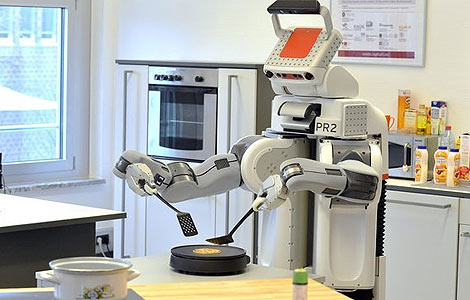Beidou to have 60% share of home market
Updated: 2013-10-11 01:41
By Cheng Yingqi (China Daily)
|
||||||||
China plans to have its satellite navigation system, Beidou, have a 60 percent share of the domestic market and 80 percent of all markets related to social and economic growth by 2020.
The central government released on Thursday medium- and long-term plans for the "sat nav" industry, all approved by the State Council.
Plans include analysis on the status of the industry, development goals of the Beidou system and major goals to be accomplished by 2020.
The goal is to increase the navigation-related industry to 400 billion yuan ($65.4 billion), popularize Beidou in both the national economy and the consumer market, and enhance the international effectiveness of the system.
To achieve the goals, the plan lists major projects for the coming years, including creating a system of more than 30 satellites by 2020, creating core technologies in navigation chip production, and spreading the use of Beidou products in key fields such as power, communications, banking and public security.
The Ministry of Transport stipulated this year that all bus tour charters and vehicles carrying hazardous materials should install the Beidou system.
But the system was not sold well in the mass market.
Hu Gang, vice-president of BDStar Navigation in Beijing, said that one of the major problems is the system's navigation chips, which are pricier than their overseas counterparts.
The Beidou navigation system uses satellites, ground stations and client terminals. Navigation chips are important parts of the client terminals as they process the location information that the terminals receive.
The Chinese-made chips are larger and more expensive than similar chips made overseas, Hu said.
"That explains the reason the Beidou system is largely used in military and industry applications and car navigation, which have lower requirements on chip size and power consumption," he said.
Hu estimated that 40 percent of Beidou's applications involve military use, while 60 percent are for industrial use.
"Popular applications, like smartphone navigation, are almost nonexistent," Hu added.
Cao Chong, director of GNSS and LBS Association of China, said China is three years behind cutting-edge chip-production technologies.
"Some countries are already able to integrate navigation chips and communication chips onto a single chip, while China is only capable of making univocal chips," he said.
Most Viewed
Editor's Picks

|

|

|

|

|

|
Today's Top News
Xi ignites Australia's zeal for FTA deal
Fire at Fukuoka hospital leaves 10 dead
Opportunity knocks for US businesses
KFC needs new faces, not new ad campaign
Yellen will focus on domestic economy
IMF cautions over DC debt drama
China calls for social reconciliation in Egypt
Kerry says US will work to end fiscal crisis
US Weekly

|

|















